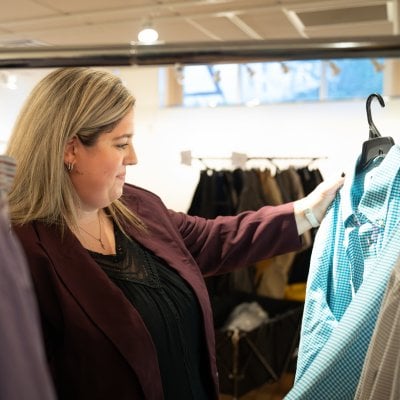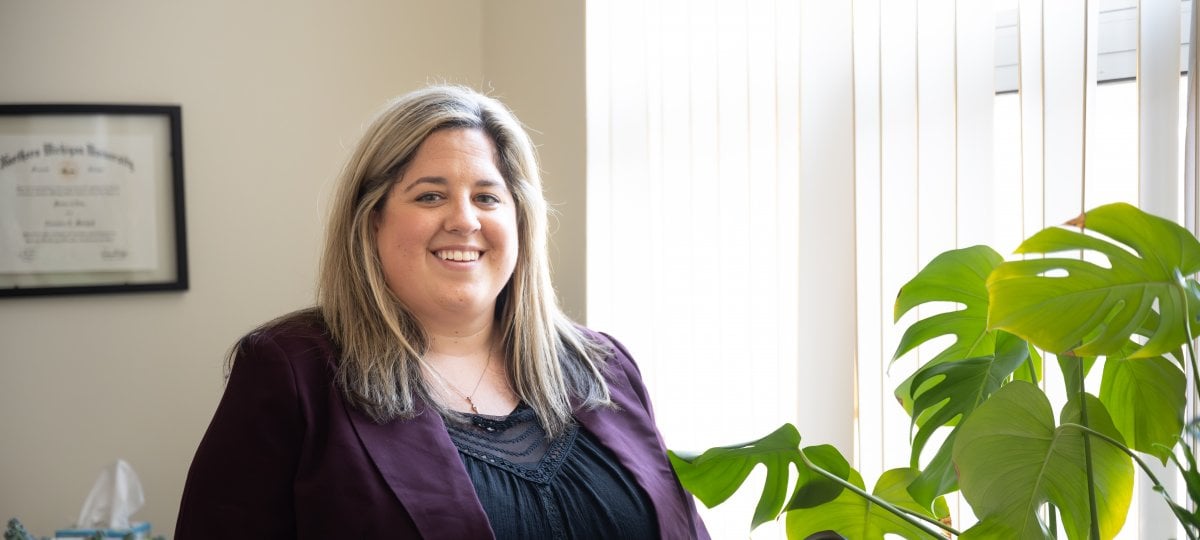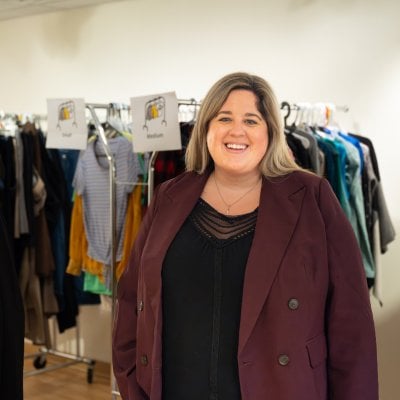Alexandra Marshall's work in Residence Education focuses on creating inclusive, supportive environments where every student feels a sense of belonging. This dedication to fostering community has earned Marshall the 2024 Michigan Technological University Diversity Award.
As director of Residence Education, Alexandra Marshall is dedicated to creating spaces within Michigan Tech's residence halls where all students can feel they belong. Through her leadership in initiatives like the Husky Closet Collective and the expansion of gender-inclusive housing, Marshall's impact has fostered diversity, equity, inclusion, and sense of belonging (DEIS) on campus.
"She consistently responds to the needs of students and takes action to meet those needs. Our campus is a more welcoming and inclusive place because of her leadership."
Colleagues and students alike describe Marshall as a leader who goes beyond simply advocating for DEIS — she takes meaningful action to support historically excluded student populations.
Marshall's efforts have been especially impactful in supporting LGBTQIA+ students and advancing all-gender housing. Kellie Raffaelli, associate vice president for student affairs and Dean of Students, said Marshall has supported LGBTQIA+ students in numerous ways. "She has been a consistent and reliable voice for our LGBTQIA+ students by organizing an LGBTQIA+ faculty, staff, and student social, where students were heard saying things like, 'This is the most comfortable I've ever been at a campus event,'" said Raffaelli.
Dawn Corwin, assistant director of Tech's Waino Wahtera Center for Student Success, highlighted Marshall's tireless work behind the scenes. "Alexandra listens to both sides of concerns and works to find the best resolution for all," said Corwin, noting that Marshall role models active listening and mediation skills for residence hall resident assistants (RAs) and Residence Education coordinators, ensuring that "every student and staff member feels supported."
In 2022, Marshall played a key role in the development of the University's pop-up barbershop program for individuals with textured hair and helped establish the Husky Closet Collective, which provides essential clothing to students in need. "She has championed the Husky Closet Collective, which now includes the Clothing Closet, Career Closet, and Gowns for Grads program," Meirow said. "These initiatives have not only supported those without financial resources but have also helped our international students and gender-diverse students in exploring their self-expression."
Marshall's commitment to DEIS in residence life extends to her day-to-day interactions with students, staff and the broader campus community.
"Her impact has a lasting effect on all those she works with, through her time, passion and fairness. She is a strong advocate for individuals, no matter their abilities, race, sexual identity or ethnicity."
In this Q&A, Marshall reflects on her journey, the challenges she has faced, and her vision for fostering a welcoming environment for all students at Michigan Tech.
Q: Why is DEIS (diversity, equity, inclusion, and sense of belonging) important in residence life?
AM: In Residence Education, we are really focused on helping students to build resilience and community. I think that DEIS fits perfectly within that. We all need to build community — a support network and a sense of belonging — to succeed. We build better communities when a variety of ideas come together. I think about the people in my life who have helped me to grow as a person and a professional. Those people didn't just agree with me, they challenged me and pushed me forward. They were able to pull from their own experiences to help me see things differently, and ultimately improve. We all learn from each other and often from the moments where we are uncomfortable.
Living in the residence halls presents these opportunities, too. Everyone living around you can connect on the basics — you're all going through similar things, but approaching them differently.
"Listening to the experiences of people who may have different experiences than you can help you to try new things and succeed. When we work to make spaces inclusive, it promotes the sharing of these ideas and helps the entire community to move forward and grow."
I think a great example of this was when students came to the Wadsworth Hall Student Association wanting to expand the gender-inclusive restrooms in the residence halls. Some students were opposed, and those who needed access to a gender-inclusive restroom were able to explain why it was important to them. Those who were initially opposed because they didn't see the need took the time to listen, understand and support the initiative.
Q: What inspired you to take on initiatives like the Husky Closet Collective and all-gender housing in your role?
AM: When I first started working in residence life, I had a student who was stapling his jeans together because he couldn't afford a new pair. I still think about that situation and how we just never know what personal and financial burdens a student may be carrying. If we can ease some of that through the Husky Closet Collective program, the hope is that the student is able to continue through their program. I can't take credit for starting gender-inclusive housing at Tech, but I am excited that I was able to work to expand the gender-inclusive options for housing and restroom use.
I have the privilege of advising the Inter-Residence Housing Council (IRHC) and was able to share with them that students had brought up the idea of expanding these options. From there, they helped me to talk to the hall councils and see if student leaders in McNair and Wadsworth were supportive. The support was overwhelming from the hall councils, so we moved forward.
"Anytime we can help students find community and feel included, I want to explore it. We may not always be able to say yes, or we may have to do something in a different way, but it's worth asking the questions."
Really, both of these initiatives started with students asking for something; I was just able to help move their ideas forward.
As for the Clothing Closet, a student from Health Occupations Students of America (HOSA) came to me asking if HOSA could do a coat drive for students. I had already been thinking about putting up a small clothing rack, so we quickly got together and found a spot on the ground floor of Wads to get it set up. Coats quickly became all winter gear, which quickly became any clothing, and the Clothing Closet was born. I'm excited that the project has grown even further.
Q: How do you ensure that students feel a sense of belonging in the residence halls?
About the Award
Established in 2014, Michigan Tech's Diversity Award showcases University faculty and staff who demonstrate exemplary commitment to initiatives that forward diversity and inclusion. Their contributions come in many forms, including recruitment, retention, teaching, research, multicultural programming, cultural competency and community outreach.
The Diversity Award winner receives a $2,500 award and is honored during the annual Faculty Awards celebration in October.
All are welcome to submit Diversity Award nominations, which are due by late April each year.
AM: Truthfully, this isn't something that I can ensure. Just because one student in one marginalized group feels that sense of belonging doesn't mean that someone who lives down the hall from them feels that way. This is work that won't ever be done — we can't just cross it off the list and say, "Great! Everyone feels they belong now!" I know that I need to be careful when we talk about these topics so that I don't start viewing people as something to be fixed or checked off of a list. This process is ongoing and I always have more to learn.
It starts with setting a tone with our staff. Our professional staff have opportunities to engage with professional development on DEIS topics. During resident assistant interviews we ask questions about community building and inclusion. We work to promote events that share a variety of viewpoints. Our residential learning model helps people connect and build relationships, but it also challenges them to think about their values, communicating their needs, who they are and how that impacts how they interact with others.
Q: What are some challenges you've encountered while promoting DEIS within Residence Education and how have you overcome them?
AM: These topics are on my mind often. I am always looking at what we are doing and thinking, "Is this the right way to approach this? Is it the right thing to do? Is this really how we should move forward?"
It can be frustrating when people don't think about how their actions can limit others' sense of belonging. Last year, we faced an issue with vandalism and damages in the residence halls. It was frustrating for our incredible facilities staff and the Residence Education staff, but as we talked to students, we learned it was equally as frustrating for them. Nobody wants to live in a place that people are destroying. Nobody wants to walk out of their room to find something broken or walk into a bathroom to find it intentionally dirty.
Addressing those vandalism concerns has been a real group effort. Our RAs, Residence Education Coordinators, facilities staff and the assistant dean of community conduct came together to meet with floors where this was an issue. We talked through why this was a problem and how it was impacting others. We quickly learned that the students were just as frustrated as we were. We got to brainstorm and work with them to determine how to move forward. They asked for a weekly email with updates on issues that had happened. They really wanted to be informed of everything happening in their communities and they helped us to identify students who were responsible. It was amazing to see them take ownership of their communities. It was clear that they cared for the place they lived and wanted to make sure others who were negatively impacted had a better experience.
Q: How have your efforts in creating safe spaces impacted the students you work with? Examples could be the Safe Place program and LGBTQIA+ affinity groups.

AM: I hope that it has shown students that we want them to be here. There have been times students have scheduled meetings with me to talk about their ideas about future projects or initiatives on campus. They may have nothing to do with residence education, but I'm always happy to have those discussions and help advocate for the things they want to see. My hope is that students know they can come to me to talk about ideas, concerns, and give me their feedback so we can work together to make campus inclusive for students of all identities.
We had a student who was a curriculum assistant for our department. He wanted to talk with the students in the identity-based student organizations to discuss their thoughts on our department and what we could do to better support them. We worked with him to come up with questions. Once we received the feedback, it helped us to adjust a few things in our resident assistant training, and we started a department Equity Audit committee to review our own processes and procedures through the lens of equity and inclusion.
Q: What has been the most rewarding aspect of your work in Residence Education, particularly in advancing DEIS initiatives?
AM: I never intended to work in residence halls for my entire career. In our department, we have the opportunity to help students through some of the toughest situations they've faced, but we also get to celebrate with them when good things happen. I've always loved those moments. Sometimes students just need a little extra encouragement or support to get through those tough moments. When we are able to provide the spaces for students to be themselves and feel like they belong, it takes some stress off of them and leaves space for those exciting moments to come around more often. If they don't feel at home here, it can make those tough moments feel so much more extreme.
"Helping to create environments that set all students up for success is what motivates me to come to work every day."
It's really rewarding to see a student who was homesick hanging out with a group of friends, or working on a cardboard boat, or helping with a snow statue. In my time here, there have been a few students who regularly stop in to my office just to catch up or because they need a piece of advice. I really enjoy those moments of being a support person who can just give them a bit of encouragement to help them through something they are stuck on. I can think of a particular student who would come into my office in a bit of a panic about how to get everything done. We would sit down and plan out when he would accomplish what for a weekend and I wouldn't hear from him again for a few weeks. He just needed someone to help him get organized on occasion and take a few minutes to listen to him. That's a small investment to make to help a student.
Q: What advice would you give to others in leadership roles who are looking to foster DEIS in their communities?
AM: Seek out opportunities to learn. Take a step back and listen. It's a humbling experience. I think for some of us it can be hard not to jump into "fix it" mode. When seeking out opportunities to learn in my field, I intentionally choose organizations that value DEIS work so things will be framed in a way that doesn't just center my identities.
Q: What's next for your DEIS work on campus? Are there any new initiatives or goals you're excited about?
AM: We had a great Career Closet event in September. We gave away over 580 items to 220 students. That was our first event in our new Clothing Closet. We just opened our new space in Wads G04W on September 27. I'm excited to expand and offer more options to students! We are also putting a pop-up rack in Daniell Heights so the students living there have an option a bit closer to home.
I am continuing to work on the Student Success Council. Our sense of belonging group is going to do some focus groups about sense of belonging in October. I'm excited to hear what students have to say and make recommendations to campus partners. We will also be offering some more socials based on identity groups to help students, staff and faculty to connect over shared identities.
As Student Affairs works toward implementing a divisional curriculum, I am excited for what opportunities will present themselves to help continue this work.
Michigan Technological University is an R1 public research university founded in 1885 in Houghton, and is home to nearly 7,500 students from more than 60 countries around the world. Consistently ranked among the best universities in the country for return on investment, Michigan's flagship technological university offers more than 185 undergraduate and graduate degree programs in science and technology, engineering, computing, forestry, business, health professions, humanities, mathematics, social sciences, and the arts. The rural campus is situated just miles from Lake Superior in Michigan's Upper Peninsula, offering year-round opportunities for outdoor adventure.







Comments